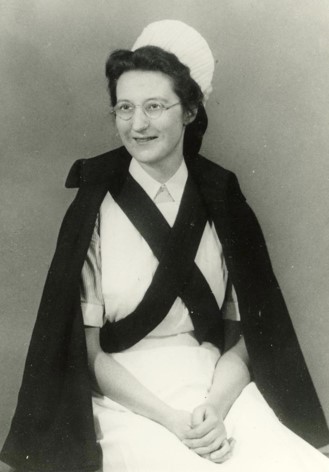Tags
Cicely Saunders, Hospice Movement, King's College London, Oral History, Outreach, Palliative Care
On 15th December 2015, King’s College London Archives hosted a workshop on palliative care records to mark the completion of the Cicely Saunders’ cataloguing project and to bring together hospice professionals, archivists and academics to learn more about the life and legacy of Cicely Saunders and to discuss the future of palliative care historical records in the UK.
We began the morning with an entertaining and revealing talk by Christopher Saunders on his sister’s life and work. He whisked through the biographical milestones of her life enlivened by examples of anecdotes and quotations from the great lady revealing her personal, humorous, side. He provided fresh insights into her life and career, including how her father was not best pleased that she dropped out of Oxford to train to be a nurse and that working at St Joseph’s Hospice had softened her religious convictions.

St Thomas’ Hospital graduation photograph of Cicely Saunders on completion of a nursing degree, 1944 [courtesy of Christopher Saunders]
This was followed by a highly insightful talk by Dr Michelle Winslow about her oral history project for Macmillan Cancer collecting histories from the terminally ill across five separate sites, chiefly in North-East England. The study provided a different, and rewarding way that history could be used in hospices: as a potential palliative tool that helps both patient and family, whilst providing a rich historical resource for future scholarship. The project initial began in 2007 at the Sheffield Macmillan Unit of Palliative Care and since accumulated 650 interviews with 450 individuals. The interviews have been recently deposited at Sheffield University Archives who are developing a system that will provide web access to the interviews.
Our final speaker in the morning was Dr Jonathan Koffman who gave an impassioned talk on the legacy of Cicely Saunders. He focussed on centred on Cicely Saunders’ clinical achievements, and not least her publications. His close reading of these shows how far she has influenced our current understanding of hospice care, including interaction with chronically sick and dying patients, addressing changes in demography and improving access to such care by ethnic communities and by administering more effective and regular pain management to those in need. He memorably presented the ‘Swiss Army Knife of palliative care’ – referring to a toolkit of approaches, including talking with patients and asking them what they want, which produces remarkable results, including fewer hospitalisations, longer survival times (25%) and less aggressive treatment (see study on ‘Early palliative care for patients with metastatic non-small cell lung cancer’ by Jennifer S Temel et al, New England Journal of Medicine, 2010).
In the second section of the workshop, we listened to a pre-recorded presentation by Professor David Clark. Professor Clark originally intended to deliver his talk in person but was required to be in Edinburgh for the launch of a Scottish Government report on palliative care. He described his involvement with the papers of Cicely Saunders which started in the mid-1990s as part of the then Hospice History Project, which forms the core of the King’s College London collection. He then reviewed his own publications on Cicely Saunders and reflected on the potential for further study on the subject. The video can be viewed here.
This was followed by a very short presentation by me on the collection and cataloguing project and a guided tour in the Archive’s reading room of collection highlights. The tour provided at first hand a sense of the breadth of the collection at King’s spanning Dame Cicely’s early career as a Lady Almoner at St Thomas’ Hospital, through to the establishment of St Christopher’s Hospice and her role within the international hospice movement.

Slide from roundtable discussion presentation. Presentation can be downloaded below:
C_S_Workshop roundtable discussion paper
There next followed a roundtable discussion focusing on the records that remain to be preserved, and how best this is to be done. I gave a short presentation outlining hospice archive holdings listed within the United Kingdom and the challenges that hospices face in developing their collections. Many of the issues raised were encapsulated in the findings of the report, Charity Archives in 21st Century by Michael McMurray (Royal Voluntary Services, 2014) which identified organisational and personnel change, limited resources and lack of awareness of charities and the archive sector as reasons for the lack of development in such archival collections. However, the discussion ended with a note of optimism with participants’ enthusiastic commitment to engage with their collections and history. It was interesting to learn that Martin House Children’s Hospice had been developing their own archives over the last three years and that Hospices UK could distribute advice to its member organisations on archival practice and training. The final word must go to Christopher Saunders who was encouraged by what he heard but felt the need for ‘dynamic leadership’ to ensure that the history of palliative care is maintained for posterity.
